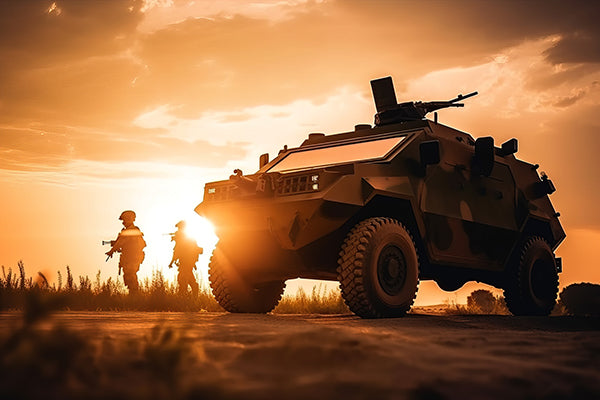
By Benjamin Nigl, Senior Account Manager
Introduction
The landscape of modern warfare is undergoing a profound transformation with the integration of cutting-edge technologies, and at the forefront of this evolution are autonomous military vehicles. Datalogging, a seemingly inconspicuous yet indispensable technology, plays a pivotal role in shaping the capabilities and effectiveness of these autonomous marvels. In this blog post, we delve into the critical role of datalogging in autonomous military vehicles and its impact on the future of defense strategies.
Securing Strategic Advantage
Datalogging in autonomous military vehicles involves the systematic recording and storage of a vast array of data, ranging from sensor inputs and environmental conditions to the vehicle's decision-making processes. This wealth of information serves as a strategic asset, enabling military planners to analyze and optimize the performance of autonomous systems in a variety of operational scenarios.

Enhanced Situational Awareness
One of the key advantages of datalogging in autonomous military vehicles is its contribution to situational awareness. The continuous recording of sensor data, such as radar, lidar, and infrared, provides a comprehensive and real-time understanding of the battlefield environment. This wealth of information empowers military commanders to make informed decisions, adapt tactics, and respond effectively to dynamic and evolving threats.
Operational Analysis and After-Action Review
Datalogging plays a crucial role in post-mission analysis and after-action review (AAR) in military operations. The recorded data allows military strategists and analysts to reconstruct and review the events leading up to and during a mission. This retrospective analysis provides valuable insights into the performance of autonomous military vehicles, aiding in the refinement of tactics, training, and the enhancement of overall mission effectiveness.
Adaptability and Continuous Improvement
Autonomous military vehicles are subjected to a wide range of operational conditions, from arid deserts to dense urban environments. Datalogging enables military engineers to understand how these vehicles navigate and respond to diverse challenges. This real-world data serves as a foundation for continuous improvement, allowing for the refinement of algorithms, navigation systems, and decision-making processes to enhance adaptability in various terrains and scenarios.
Reducing Soldier Exposure to Risks
The deployment of autonomous military vehicles equipped with advanced datalogging capabilities contributes to the reduction of risks faced by military personnel. By assuming roles such as reconnaissance, surveillance, and logistics, these vehicles enable soldiers to operate at a safer distance from potential threats. Datalogging facilitates the analysis of vehicle behavior in hazardous conditions, ensuring that autonomous systems can reliably execute missions while minimizing human exposure to danger.

Challenges and Ethical Considerations
While the benefits of datalogging in autonomous military vehicles are clear, there are challenges and ethical considerations that must be addressed. Data security, privacy concerns, and the potential for misuse of collected information are critical issues that demand careful attention. Striking a balance between operational effectiveness and ethical use of technology is essential for the responsible deployment of autonomous military systems.
Conclusion
Datalogging stands as a linchpin in the realm of autonomous military vehicles, shaping the future of defense strategies and ensuring a strategic edge in modern warfare. Its role in enhancing situational awareness, facilitating post-mission analysis, and driving continuous improvement underscores its significance in the development and deployment of these advanced military technologies. As datalogging capabilities evolve, so too will the effectiveness and adaptability of autonomous military vehicles, redefining the landscape of defense in the 21st century.
Click the buttons below to share this blog post!

The character of modern warfare is being reshaped by data. Sensors, autonomy, electronic warfare, and AI-driven decision systems are now decisive advantages, but only if compute power can be deployed fast enough and close enough to the fight. This reality sits at the center of recent guidance from the Trump administration and Secretary of War Pete Hegseth, who has repeatedly emphasized that “speed wins; speed dominates” and that advanced compute must move “from the data center to the battlefield.”
OSS specializes in taking the latest commercial GPU, FPGA, NIC, and NVMe technologies, the same acceleration platforms driving hyperscale data centers, and delivering them in rugged, deployable systems purpose-built for U.S. military platforms. At a moment when the Department of War is prioritizing speed, adaptability, and commercial technology insertion, OSS sits at the intersection of performance, ruggedization, and rapid deployment.

Maritime dominance has long been a foundation of U.S. national security and allied stability. Control of the seas enables freedom of navigation, power projection, deterrence, and protection of global trade routes. As the maritime battlespace becomes increasingly contested, congested, and data-driven, dominance is no longer defined solely by the number of ships or missiles, but by the ability to sense, decide, and act faster than adversaries. Rugged High Performance Edge Compute (HPeC) solutions have become a decisive enabler of this advantage.
At the same time, senior Department of War leadership—including directives from the Secretary of War—has made clear that maintaining superiority requires rapid integration of advanced commercial technology into military platforms at the speed of need. Traditional acquisition timelines measured in years are no longer compatible with the pace of technological change or modern threats. Rugged HPeC solutions from One Stop Systems (OSS) directly addresses this challenge.

Initial design and prototype order valued at approximately $1.2 million
Integration of OSS hardware into prime contractor system further validates OSS capabilities for next-generation 360-degree vision and sensor processing solutions
ESCONDIDO, Calif., Jan. 07, 2026 (GLOBE NEWSWIRE) -- One Stop Systems, Inc. (OSS or the Company) (Nasdaq: OSS), a leader in rugged Enterprise Class compute for artificial intelligence (AI), machine learning (ML) and sensor processing at the edge, today announced it has received an approximately $1.2 million pre-production order from a new U.S. defense prime contractor for the design, development, and delivery of ruggedized integrated compute and visualization systems for U.S. Army combat vehicles.